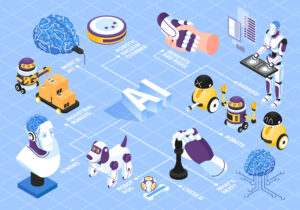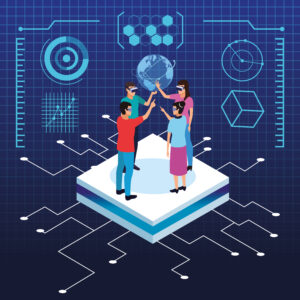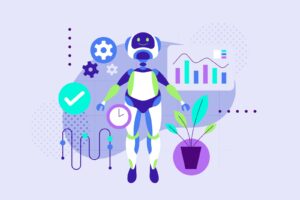Ai In Future Technology
Introduction
Artificial Intelligence (Ai) has rapidly evolved over the years, transforming industries, societies, and paving the way for an unprecedented future. It explores the remarkable journey of AI, its profound impact on various sectors, the benefits it brings to humanity, and its potential implications for the future.
Evolution of Ai
Ai in the 21st Century
The current Ai landscape is characterized by diverse applications, from virtual assistants and recommendation systems to autonomous vehicles and medical diagnostics. Reinforcement learning has emerged as a powerful technique for training Ai systems, allowing them to make decisions based on trial and error. Ai is not confined to academia but has become an integral part of industries and everyday life.
The Road Ahead
As we look to the Ai in future technology, the evolution of Ai promises even more sophistication. Quantum computing, explainable Ai, and the integration of Ai with other emerging technologies like blockchain are on the horizon. Ethical considerations, interpretability, and addressing biases will be critical aspects as Ai continues to evolve and shape the technological landscape.
How Artificial Intelligence Transforms Industries

Artificial Intelligence (Ai) has become a catalyst for transformative change across industries, reshaping traditional paradigms and unlocking unprecedented possibilities. The seamless integration of AI in future technology has not only optimized processes but has also birthed entirely new business models. Let’s delve into the intricate ways in which various sectors are undergoing a profound metamorphosis.
Healthcare: In healthcare, Ai is revolutionizing diagnostics, treatment, and patient care. Machine learning algorithms analyse medical data to detect patterns, aiding in early disease diagnosis. Ai -driven predictive analytics helps healthcare professionals identify high-risk patients and personalize treatment plans. Surgical robots, powered by AI, enhance precision in surgeries. The healthcare sector is witnessing an evolution towards data-driven decision-making, improving both patient outcomes and operational efficiency.
Finance: The financial industry embraces Ai for risk management, fraud detection, and customer service. Ai algorithms analyze vast datasets to identify anomalies and potential fraud in real-time, ensuring the security of financial transactions. Chatbots and virtual assistants powered by Ai enhance customer interactions, providing personalized financial advice and improving the overall customer experience. Algorithmic trading, guided by Ai, optimizes investment strategies, contributing to more efficient and informed decision-making.
Manufacturing: Manufacturing is undergoing a paradigm shift with the adoption of future technologies driven by AI. Predictive maintenance, powered by machine learning, minimizes downtime by anticipating equipment failures. AI-guided robotics and automation streamline production processes, ensuring higher efficiency and quality. The integration of AI in demand forecasting optimizes supply chain management, reducing wastage. The manufacturing landscape is evolving towards a more agile and data-driven model, thanks to the infusion of Ai in future technology.
Transportation: Ai is at the forefront of transforming the transportation industry, particularly with the development of autonomous vehicles. Machine learning algorithms enable self-driving cars to navigate complex environments and make real-time decisions. Predictive analytics optimizes logistics, reducing delays and improving overall efficiency. Ai-powered traffic management systems enhance urban mobility, contributing to smarter and more sustainable transportation solutions.
Retail: In the retail sector, AI is redefining customer experiences and optimizing operational efficiency through future technologies. Recommendation systems powered by machine learning analyze customer preferences, providing personalized product suggestions. AI-driven chatbots enhance customer service by handling inquiries and assisting with purchases. Inventory management benefits from predictive analytics, reducing stockouts and overstock situations. The retail landscape is evolving towards a more customer-centric and data-driven approach, leveraging AI in future technology.
Telecommunications: In the telecommunications industry, Ai plays a crucial role in network optimization, predictive maintenance, and customer service. Ai algorithms analyse network data to predict and prevent potential failures, ensuring uninterrupted communication services. Chatbots and virtual assistants enhance customer support, addressing queries and issues efficiently. The deployment of Ai in telecommunications is optimizing network performance and improving the overall customer experience.
The pervasive influence of Ai in future technology is evident across diverse industries, ushering in unprecedented advancements, increased efficiency, and innovative solutions. As AI continues to evolve, its impact on various sectors will likely deepen, marking the beginning of a new era of possibilities and transformations in future technologies.

How Ai in future Technology Impact on Society
The integration of Artificial Intelligence (Ai) into our society is akin to weaving a complex tapestry, where threads of innovation, convenience, and ethical considerations intertwine. The societal impact of AI is profound, touching upon various aspects of our daily lives, from communication and entertainment to healthcare and governance. This exploration delves into the multifaceted ways in which Ai is shaping our societal landscape.
- Accessibility to Information: One of the most noticeable societal impacts of Ai is the enhanced accessibility to information. Voice-activated virtual assistants and smart search algorithms powered by Ai have made it easier for individuals to access a wealth of information instantaneously. This democratization of knowledge has the potential to bridge information gaps and empower people across diverse socio-economic backgrounds.
- Personalized Experiences: Ai algorithms are redefining personalized experiences, from tailored content recommendations on streaming platforms to customized product suggestions in e-commerce. This shift towards personalization not only improves user satisfaction but also influences consumer behavior and preferences. However, the challenge lies in balancing personalization with privacy concerns, ensuring that individuals retain control over their personal data.
- Urban Planning and Smart Cities: The concept of smart cities is gaining momentum, with Ai contributing to urban planning and infrastructure development. Predictive analytics and data-driven insights enable city planners to optimize resources, manage traffic flow, and enhance public services. However, the ethical implications of extensive surveillance and data collection in smart cities raise concerns about individual privacy and civil liberties.
- Ethical Considerations and Bias: The ethical dimensions of Ai are a critical aspect of its societal impact. Bias in Ai algorithms, often reflective of historical prejudices present in training data, can perpetuate and amplify societal inequalities. Addressing these biases requires a concerted effort to develop more inclusive and fair Ai systems, promoting transparency and accountability in their design and deployment.
- Privacy Concerns: As Ai systems process vast amounts of personal data, privacy concerns come to the forefront. Facial recognition technology, surveillance applications, and data mining raise questions about the boundaries between convenience and individual privacy. Striking a balance between the benefits of Ai and safeguarding privacy rights necessitates robust regulations and ethical frameworks.
- Digital Divide: The integration of Ai has the potential to exacerbate existing societal disparities, creating a digital divide between those who have access to Ai-driven technologies and those who do not. Bridging this gap requires concerted efforts in digital literacy, infrastructure development, and ensuring equitable access to Ai-related opportunities, preventing the marginalization of certain demographics.
- Job Displacement and Reskilling: Ai’s impact on the job market is a topic of considerable discussion. While automation may lead to the displacement of certain routine jobs, it also creates opportunities for new roles in Ai development, data science, and related fields. The key lies in proactive reskilling and upskilling initiatives to prepare the workforce for the evolving demands of the job market.
- Healthcare Advancements: Ais societal impact in healthcare is transformative. From diagnostic tools and predictive analytics to personalized treatment plans, Ai is enhancing patient outcomes and revolutionizing healthcare delivery. The integration of Ai in healthcare, however, necessitates careful consideration of ethical guidelines, data security, and ensuring that technological advancements benefit all segments of society
How does Ai in future Technology effect the Education?
The integration of artificial intelligence (Ai) into education is reshaping the future of learning and teaching. From personalized learning experiences to administrative efficiency, Ai is making significant strides in enhancing various facets of education. Here’s a detailed exploration of how Ai is influencing the future of education:
- Personalized Learning: Ai enables the creation of adaptive learning systems that cater to individual student needs. Through the analysis of student performance and learning styles, Ai algorithms can tailor educational content, pacing, and assessments. This personalized approach ensures that each student can progress at their own pace, reinforcing concepts as needed and advancing when they are ready.
- Customized Curriculum: Ai can assist educators in developing and updating curriculum materials. By analyzing trends in educational data and industry requirements, Ai algorithms can recommend adjustments to curriculum content, ensuring that it remains relevant and aligned with the needs of the evolving job market.
- Intelligent Tutoring Systems: Ai -driven tutoring systems provide students with additional support outside the classroom. These systems can identify areas where a student is struggling and offer targeted exercises or explanations to reinforce understanding. Intelligent tutoring systems can adapt in real-time based on the student’s progress, making the learning experience more efficient and effective.
- Automated Assessment and Feedback: AI can streamline the assessment process by automating grading for certain types of assignments and assessments. This not only saves educators time but also provides students with immediate feedback. Additionally, AI can analyze assessment data to identify areas where the class as a whole may need additional instruction or clarification.
- Enhanced Administrative Efficiency: Educational institutions handle vast amounts of administrative tasks, from admissions to scheduling and resource allocation. Ai can automate these processes, reducing the administrative burden on staff and allowing them to focus on more strategic aspects of education delivery. Chatbots powered by Ai can handle routine queries, freeing up human resources for more complex interactions.
- Virtual Classrooms and Remote Learning: Ai plays a crucial role in the development of virtual classrooms and online learning platforms. Natural language processing (NLP) and machine learning algorithms can facilitate real-time interaction, providing a more engaging and interactive online learning experience. Ai-driven platforms can also analyze student engagement data to continually improve the virtual learning environment.
- Data-Driven Decision Making: Ai enables educators and administrators to make data-driven decisions. By analyzing large datasets, Ai can identify trends, predict student performance, and highlight areas for improvement. This data-driven approach can inform policy decisions, resource allocation, and instructional strategies, leading to more effective educational outcomes.
- Inclusive Education: Ai tools can be designed to support students with diverse learning needs. For example, speech-to-text and text-to-speech technologies can assist students with disabilities. Ai-driven translation tools can enhance language learning for students from different linguistic backgrounds, promoting inclusivity in education.
- Lifelong Learning and Skill Development: As the job market evolves, there is an increasing emphasis on lifelong learning. Ai can facilitate personalized, continuous learning experiences, helping individuals acquire new skills and adapt to changing industry requirements throughout their careers.
- Ethical Considerations and Data Privacy: It’s crucial to address ethical considerations and data privacy concerns in the integration of Ai in education. Ensuring the responsible use of Ai technologies, protecting student data, and maintaining transparency in algorithms are essential aspects of building trust in Ai-driven educational system
Ai in the Near Future
The impact of Ai on future technology is poised to be revolutionary, shaping various aspects of our lives, industries, and society. As we navigate the near future, Ai is set to play a pivotal role in several domains:
Healthcare and Ai in Future Technology: Ai will revolutionize healthcare by enabling more accurate diagnostics, personalized treatment plans, and drug discovery. Advanced algorithms will analyze vast datasets, leading to quicker and more precise medical interventions. Ai-powered robots may assist in surgeries, and wearable devices with Ai capabilities will monitor health in real-time.
Ai in Future Technology for Education: The future of education will witness the integration of Ai in personalized learning experiences. Ai algorithms will adapt to individual learning styles, offering tailored educational content. Virtual tutors and Ai-assisted grading systems will streamline educational processes, providing students with a more customized and efficient learning journey.
Automotive and Ai Integration: The automotive industry is on the verge of a transformative era with the advent of Ai. Autonomous vehicles, powered by advanced AI algorithms, will redefine transportation. Ai in future technology will enhance road safety, optimize traffic flow, and contribute to the development of smart cities, creating a seamless and efficient transportation network.
Ai’s Role in Future Technology for Cybersecurity: As cyber threats become more sophisticated, Ai will play a crucial role in fortifying cybersecurity measures. Ai algorithms will analyze patterns, detect anomalies, and respond in real-time to potential security breaches. Adaptive and self-learning Ai systems will strengthen the resilience of digital infrastructures against evolving cyber threats.
Business and Ai in Future Technology: Ai will reshape the business landscape by optimizing operations, automating routine tasks, and providing data-driven insights. Ai-driven analytics will enhance decision-making processes, enabling companies to stay agile in a rapidly changing environment. Chatbots and virtual assistants will become integral for customer service, enhancing user experiences.
Ai and Future Technology in Environmental Conservation: Ai will be a powerful ally in addressing environmental challenges. From predicting climate patterns to optimizing energy consumption, Ai algorithms will contribute to sustainable practices. Smart grids, powered by Ai, will efficiently manage energy distribution, and Ai-driven monitoring systems will help in wildlife conservation and environmental protection.
Ai in Future Technology for Social Impact: The near future will witness Ai being harnessed for social good. Ai-driven solutions will aid in disaster response, humanitarian efforts, and addressing societal issues. Predictive analytics and Ai models will assist governments and organizations in making informed decisions to mitigate the impact of natural disasters and crises.
Ai-Enhanced Creativity in Future Technology: Ai will collaborate with human creativity, transforming the fields of art, music, and design. Creative Ai algorithms will assist artists and designers, suggesting innovative ideas and contributing to the development of unique and captivating content. Ai-generated art and music will become increasingly prevalent.

Usage of Ai in the Future
The Ai in future technology sees penetrating deeper into critical domains. Quantum computing, coupled with Ai, promises groundbreaking solutions to complex problems. Ai-powered cybersecurity systems will fortify digital defenses, while AI in agriculture will optimize crop yields. The fusion of Ai with augmented reality will create immersive experiences, transforming entertainment, and business interactions.
Impact on Job Opportunities
The integration of Ai into industries raises concerns about job displacement. While routine tasks may become automated, Ai also creates new job opportunities in areas such as Ai development, data science, and AI ethics. Reskilling and upskilling initiatives are essential to prepare the workforce for the evolving job landscape, ensuring a symbiotic relationship between humans and Ai.
Risks of Ai
Bias and Discrimination in AI-Driven Decision-Making:
- AI in future technology may inherit biases present in historical data, potentially leading to discriminatory outcomes. Ensuring fairness and mitigating bias in AI systems is crucial to prevent the perpetuation of inequalities in various sectors.
Job Displacement Due to AI Automation in Future Technology:
- The widespread adoption of AI in future technology could lead to job displacement as routine tasks become automated. Workers in industries heavily relying on manual and repetitive activities may face challenges in transitioning to roles that require a higher level of creativity and problem-solving.
Security Concerns in AI Systems:
- The integration of AI in future technology introduces new security risks. As AI systems become more complex, they may become targets for cyber attacks and unauthorized access. Safeguarding AI technologies against malicious activities will be essential to prevent data breaches and system vulnerabilities.
Ethical Dilemmas and Lack of Transparency:
- AI in future technology may give rise to ethical dilemmas, especially in decision-making scenarios where the logic behind AI-driven choices is complex and opaque. Maintaining transparency in AI algorithms and decision processes is crucial to build trust and address ethical concerns.
Dependency on AI for Critical Decision-Making:
- Overreliance on AI in future technology for critical decision-making, such as in healthcare or finance, may lead to unintended consequences if the AI system malfunctions or misinterprets information. Balancing the role of AI with human judgment and oversight is essential to prevent catastrophic errors.
Data Privacy Challenges in AI Applications:
- AI in future technology relies heavily on vast amounts of data for training and improvement. This raises concerns about the privacy of individuals, as personal information becomes integral to AI processes. Striking a balance between utilizing data for AI advancements and respecting privacy rights is a significant challenge.
AI-Powered Disinformation and Manipulation:
- The integration of AI in future technology may exacerbate the challenges associated with deepfake technology and AI-generated content. Malicious actors could use AI to create convincing fake information, leading to increased risks of disinformation, propaganda, and manipulation.
Lack of Regulation and Standardization in AI Development:
- The rapid evolution of AI in future technology may outpace the development of regulatory frameworks and industry standards. This can result in a lack of accountability and consistency in AI applications, posing challenges in ensuring responsible and ethical AI development.
Unintended Consequences and Systemic Risks:
- The complexity of AI systems in future technology introduces the risk of unintended consequences. Issues such as system biases, unexpected behavior, or unintended side effects may arise, requiring ongoing monitoring and adaptation to minimize unforeseen negative impacts.
Environmental Impact of AI Infrastructure:
- The growing demand for computational power in AI, especially with the development of more advanced models, may contribute to increased energy consumption and environmental impact. Balancing the benefits of AI with sustainable practices is crucial to minimize the ecological footprint associated with AI infrastructure in future technology.
Conclusion
In conclusion, the trajectory of AI in future technology is undeniably transformative, ushering in a new era marked by unprecedented advancements and challenges. As we navigate the integration of AI in future technology, it is imperative to recognize the dual nature of its impact. AI in future technology holds the promise of revolutionizing industries, fostering innovation, and enhancing efficiency across diverse sectors.
However, the responsible deployment of AI in future technology demands vigilance in addressing inherent risks such as bias, job displacement, security concerns, and ethical dilemmas. Striking a delicate balance between harnessing the potential of AI in future technology and mitigating its associated risks requires collaborative efforts from researchers, policymakers, and society at large. By fostering a culture of ethical development, transparency, and continuous scrutiny, we can harness the power of AI in future technology to shape a more intelligent, inclusive, and sustainable future for all
